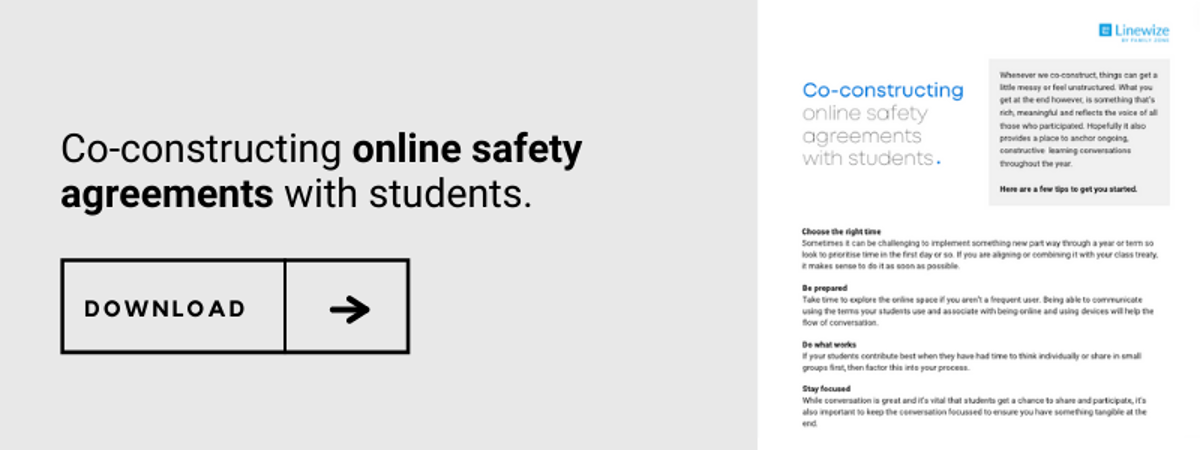Co-constructing online safety agreements with students
December 8, 2021

Having students sign agreements around how they will use and not use online spaces and digital devices has long been common practice in schools/kura. Beyond simply being a ‘one size fits all’ tool for compliance, agreements about how devices and online spaces are used have the opportunity to be a powerful vehicle for launching conversations and an authentic opportunity for meaningful collaboration.
When we think about the existing agreements we have in schools around behaviour and responsibility, we immediately look to school values, student learner profiles and classroom treaties. These provide great frameworks for approaching online safety and digital wellbeing. What we have come to understand after over 15 years of students using online tools for learning, is that safety online has less to do with ‘the technology’ and more to do with ‘behaviour’, and school values-driven classroom treaties are important frameworks in this space.
Download our guide for co-constructing online safety agreements
The importance of a collaborative process
Allowing students to collaborate and feed into the process (and the outcomes), ensures not only that they feel heard and valued, but also their buy-in and understanding. A signature on the bottom of a document they don’t understand has little meaning. However, something they have shaped and contributed to becomes a part of what they understand about their role in ensuring a safe online learning environment for everyone.
Having that document visible and constantly referred to increases understanding and helps to build the skills, knowledge and behaviours needed to self manage their use of devices and online spaces.
What to consider including in your online safety student agreements
- Installation of software
- Equipment care
- School security
- Monitoring & filtering
- Personal account security
- Attribution and Copyright
- Accessing Content
- Creating content
- Consent
- Behaviour and respect for others
- Reporting incidents
- Personal devices
- Consequences
Download our guide for co-constructing online safety agreements
Tips for a productive conversation
Cover the agreement over several sessions
Rather than trying to do everything in one go, we recommend scheduling several shorter sessions. This will encourage reflection and make the process more inclusive for those students who are able to contribute better when they have had time to think individually.
You don’t need to be an expert
Before your lessons, take time to explore the online space if you aren’t a frequent user. Being able to communicate using the terms your students use and associate with being online and using devices will help the flow of conversation.
While it’s important you become familiar, you don’t need to be an online expert. Gaps in your knowledge or experience and asking for advice is a great way to engage in conversation with your students.
Consider both boundaries and flexibility
An online use agreement is an exercise in boundary setting, so it’s important to consider and identify your non-negotiables upfront. As you do this, consider what areas you might be open to compromise.
For this to be truly collaborative, students will need the opportunity to shape this agreement. Young people look at the world from a different perspective and so be ready to compromise. They will likely think about things you hadn’t considered.
Be mindful of your language
You don’t want these sessions to seem like you’re telling the students off, so frame the agreement using positive language, choosing words like ‘always’ instead of ‘never’.
Use the language your students are comfortable with and understand. It’s no use getting all technical with the right words if it doesn’t resonate with your students. They need to be able to articulate what the guidelines say and mean in their context and to them.
The start of the school year is the perfect time to set expectations
When students arrive at the start of the school year, we suggest one of the first things you do with them is to begin co-constructing a set of expectations to guide interactions and learning throughout the year whether online or offline.
Check out our detailed guide for co-constructing online safety agreements here -
Getting the most from your Linewize solution
If you would like to ensure your school community is receiving the maximum benefit from your Linewize solution, please reach out to your Success Manager or contact us here and we'll be in touch.
Topics: Cyber Safety, classroom management, schools, online safety, Policy
Would you like some more information? Or a demo?
Get in touchSubscribe to our newsletter
Popular posts
Recent posts
ySafe | How Schools Are Structuring Their Cyber Safety Days (and Why It Works)
Schools often ask us what a full cyber safety day actually looks like. The truth is, there’s no single template. Every school has its own ...
